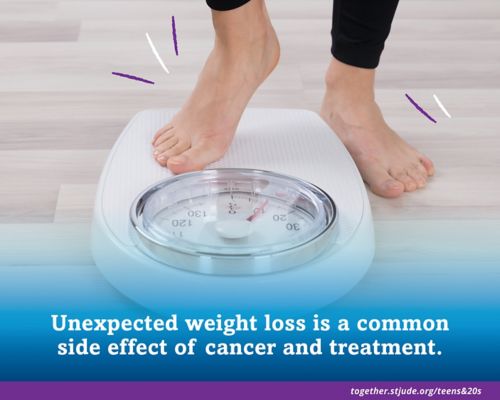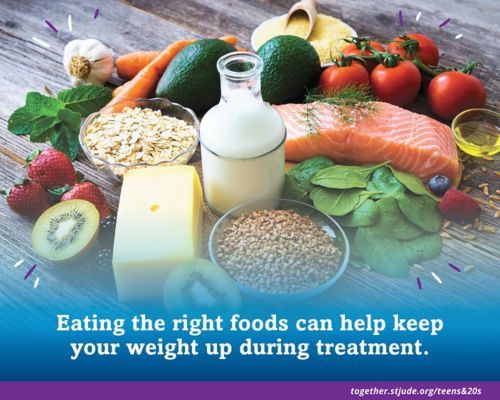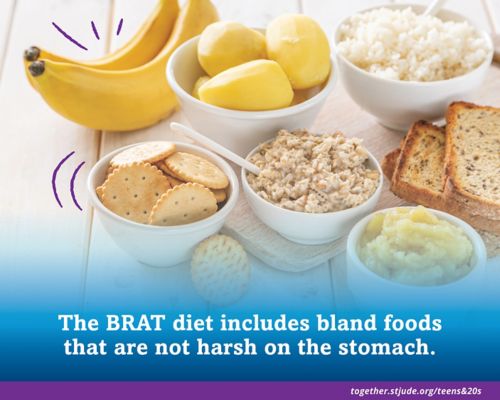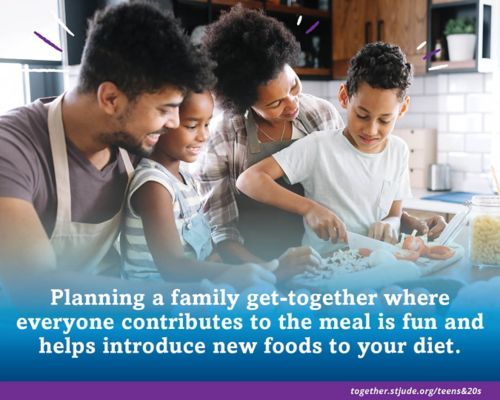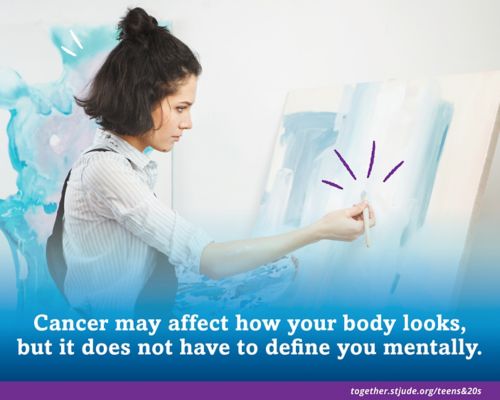As a young adult, your body is changing. It is normal to expect fluctuations in height and weight. Unexpected weight loss is often seen as a common side effect of cancer and treatment. You may notice weight loss as a result of:
- Cancer itself
- Depression, stress, or anxiety
- Digestive or stomach disorders
- Fatigue
- Hormonal or metabolic changes
- Nausea and vomiting
- Poor apetite
- Treatment- chemotherapy, radiation, or different medications
Weight loss may seem like a positive side effect to some young adults, but weight loss during illness can be harmful. You risk weakening your health if you lose too much weight. If you do notice rapid weight loss, consult with your doctor and express your concerns.
Eat healthy
During cancer treatment, eating may not seem appealing to you. But it is important to eat healthy when you can to avoid losing nutrients needed for growth and healing. Food intake that is too low can cause muscle mass loss and vitamin deficiency. It may be a good idea to keep track of what you are eating to make sure you are getting enough nutrients. A food diary helps you examine your daily eating habits and make healthy changes. You can also consult with a registered dietitian to get personalized food suggestions.
Eating the right foods can help keep your weight up during treatment.
- High-protein – Eat foods that are high in protein.
- Rainbow diet – One way to make sure your meals are healthy is by following the rainbow diet. This diet consists of eating green, orange, purple, red, and yellow fruits and veggies.
- Whole foods – You also want to eat whole foods. Whole foods have little to no processing. Examples are whole grains and fresh fruits and vegetables.
- It is important to stay hydrated throughout the day. To avoid dehydration, try to limit your intake of caffeine and alcohol.
You have options if you feel nauseated or have trouble eating enough. Try the BRAT diet, which stands for bananas, rice, applesauce, and toast. The BRAT diet includes bland foods that are not harsh on the stomach. Eat foods that fall into the BRAT diet category until you feel like you can try other foods. Simple bland foods that are also allowed on the BRAT diet include mashed potatoes, oatmeal, cream of wheat or rice, baked potatoes without toppings, plain pasta, and decaffeinated tea. Yogurt is a healthy food choice with probiotics so adding yogurt to your diet may be helpful once your stomach feels better. During the time that you are on the BRAT diet we suggest you skip milk products that might make nausea worse. Also skipping high-fat fried foods and fast foods is also suggested if you feel sick.
Are you struggling to eat? These tips may help:
- Don’t force yourself to eat if you can’t.
- Eat your favorite foods if that is what sounds good to you.
- Have small meals throughout the day, rather than three big meals at breakfast, lunch and dinner.
- Stay hydrated... but if drinking liquids with your meals makes you sick, drink fluids between meals.
Stay active
Too much weight loss during cancer treatment can cause physical symptoms like skin rashes, poor vision, and fatigue. These symptoms may make you feel bad and make you want to lay around all the time. While adequate sleep and rest are important, you want to try to stay active and be able to do the things you enjoy too.
Try to find a family member or friend who can help you stay active. Meeting someone for a daily walk is a great idea. If you feel too weak for exercise, see if someone can organize a less strenuous activity. Light exercise might stimulate your appetite. See a physical therapist for help picking the right activity for you.
Another activity that is perfect for counteracting weight loss is cooking. Planning a family get together where everyone contributes to the meal is fun and helps introduce new foods to your diet.
Keep mentally healthy
Most young adults and teens will feel strong emotions about losing weight. You may find that you are struggling to eat because of stress, anxiety, or sadness. If you are feeling these emotions, it is normal. If you are feeling anxiety about your self-image or self-conscious about how others view you, know that how you are feeling is OK. Sometimes talking about these feelings can help. Talking to your family and friends will help them have a better understanding of how you are feeling. If weight changes are bothering or concerning you, seek support with a mental health provider.
Dealing with changes to your body image is never easy, especially when receiving treatment for cancer. Some patients have previously experienced eating disorders or body dysmorphia (a disorder where a person obsessively focuses on a real or imagined body flaw) that can make these changes particularly challenging to navigate. New weight loss may trigger stress. You are not alone and talking to someone you trust can help. It’s OK to ask for support.
Steps for a positive life view
It is important to remember that weight loss during cancer treatment is not abnormal. Cancer may affect how your body looks, but it does not have to define you mentally. Here are some ways you can positively address mental health:
- Find hobbies that make you feel good about yourself and the way you look.
- Have a routine. This can help keep you active, combat negative emotions, and give a sense of purpose to each day. This is called “behavioral activation.” Hang out with friends and family you feel safe around. Keeping in contact with trusted friends and family can be a valuable source of support. Let them know how you’re feeling if you feel comfortable being open.
- Wear clothes that you find comfortable or feel good about wearing.
- Practice gratitude. Identifying three good things that happens each day can lift your mood and help you focus on positive aspects.


